Inbound Links
What are Inbound Links?
An Inbound Link is a hyperlink originating from another website directing customers to your site. The term “inbound” is used by the person receiving the link. They are important for Search Engine Optimization (SEO) rankings because Google and other search engines use the number of inbound links as an indicator when determining site ranking. The more inbound links a page has, the more likely its content is relevant and useful.
Since an in inbound link is observed when another link comes directly to your website from another site. The person who received the link is getting an “inbound” whereas the link going to the external page is an “outbound link.” Inbound links come into your site, whereas outbound links leave your site.
Why are Inbound Links Helpful?
Inbound links are helpful for a few reasons. First and foremost, they help with your Search Engine Optimization (SEO). Websites that receive many inbound links are more likely to rank higher in search engines. These inbound links tell the search engines that the website is an authority in a certain subject area., therefore, your site must contain more relevant, high-quality information. It is important to note that search engines also look at other factors when determining search ranking. For this reason, it is important to ensure you are applying other SEO ranking practices and not just focusing on the number of links.
The second reason inbound links are extremely helpful is referral traffic. If someone clicks on a hyperlink directing them to your page, you can benefit from that site visit. It is beneficial because they might not have visited your website prior to seeing the link. The volume of traffic you get from inbound links varies, but it can help direct extra traffic to your web page, make your more credible, lead to higher conversion, and generate more profits for your company. It is also imperative that the link comes from an authoritative website, using proper anchor text.
How to Increase Inbound Links
Maintain a Blog With Strong Content
Consistent, creative blog content that people like to reach and find interesting will make it easier to generate links. People naturally want to refer great content to their readers and customers. It is a strong way to organically generate inbound links.
Link to Other Blogs From Your Blog
Blogs are meant to be a social tool. Therefore, the more you link to other people’s blogs, the more likely they will return the favor and help you generate traffic. It is also hard to cover all topics with a high level of quality, so it makes sense to refer users to other resources to make their experience as rewarding as possible.
Write Guest Blogs
Writing great blogs and shopping them around for a good fit can be extremely beneficial to your site. If another site enjoys your content, you will most likely get an inbound link in one of their posts. If you are having a difficult time finding someone to send your guest post to, turn to media outlets like Business Insider or even Mashable. Most media outlets allow you to submit original articles so long as the topic is relevant to their readership.
Create and Publish Resource Lists
Resource lists can be excellent bait to attract new readers. If you create a comprehensive resource list, it will be easy for bloggers to hyperlink to it in their own posts as opposed to re-wording the content themselves.
Create Free Tools/Templates
Free tools and templates are a great asset to generate new links. If they are well-designed people will love linking and sharing them. They key is providing tools and templates that make people’s jobs easier. If you can effectively meet their needs, then you will surely generate more inbound links.
What Defines Good Inbound Linking?
Good inbound links are defined by the use of natural, proper anchor text and the coming from a website that is trusted and an authority on certain subjects. Having spammy, hyperlinked text copy inside press releases and articles is considered unnatural anchor text by Google. The important part is to have proper inbound links deriving from websites with good knowledge of proper anchor text.

